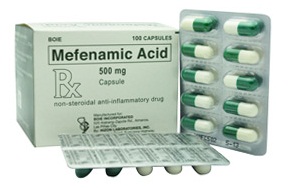



Mefenamic acid is a common medication used to treat various types of pain. It belongs to a group of drugs called non-steroidal anti-inflammatory drugs (NSAIDs), which is typically taken by mouth. It works by reducing your body's production of an inflammatory substance that causes fever, swelling and pain.
Although mefenamic acid is a medication that may be bought over-the-counter, there are some things to keep in mind before taking it, including:
Take mefenamic acid as directed by your doctor or as written on the medication’s label. You should check with your doctor or pharmacist if you are not sure. The following are some important things you should keep in mind when taking mefenamic acid:
Mefenamic is effective in treating pain and inflammation, but like other medications, it may have some side effects. It may also interact with other medications or medical conditions, so it’s advisable to tell your doctor if you are taking other medications. Let’s take a look at the side effects and interactions when taking mefenamic acid.
|
Side Effects |
Interactions |
|
|
Stop using mefenamic acid and immediately contact your doctor IF:
Call your local poison control center immediately. If a victim has collapsed or is not breathing, call 911 right away.
As mentioned above, mefenamic acid overdose symptoms include: